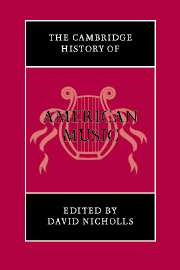Book contents
- Frontmatter
- PART ONE
- PART TWO
- 10 Music in America: an overview (part 2)
- 11 Immigrant, folk, and regional musics in the twentieth century
- 12 Popular song and popular music on stage and film
- 13 The rock and roll era
- 14 Ragtime and early jazz
- 15 Jazz from 1930 to 1960
- 16 Jazz since 1960
- 17 Tonal traditions in art music from 1920 to 1960
- 18 Serialism and complexity
- 19 Avant-garde and experimental music
- 20 Tonal traditions in art music since 1960
- Bibliography and references
- Index
- References
14 - Ragtime and early jazz
from PART TWO
Published online by Cambridge University Press: 28 March 2008
- Frontmatter
- PART ONE
- PART TWO
- 10 Music in America: an overview (part 2)
- 11 Immigrant, folk, and regional musics in the twentieth century
- 12 Popular song and popular music on stage and film
- 13 The rock and roll era
- 14 Ragtime and early jazz
- 15 Jazz from 1930 to 1960
- 16 Jazz since 1960
- 17 Tonal traditions in art music from 1920 to 1960
- 18 Serialism and complexity
- 19 Avant-garde and experimental music
- 20 Tonal traditions in art music since 1960
- Bibliography and references
- Index
- References
Summary
Never min’, for the time
Comin’ mighty soon,
When the best like the rest
Gwine a-be singin’ coon.
(will marion cook, Darktown Is Out Tonight)
These astonishing lines from a song written in 1898 may be read as a harbinger of key developments in twentieth-century American music. Behind the mask of racist, stereotyped black dialect that marked the popular genre known as coon song, the black composer Will Marion Cook (1869–1944) makes a sly and powerful assertion: that African American music would become a universal musical language, that everyone would soon be “singin’ coon.” At least two things made it possible for Cook to imagine that scenario. First, a new generation of African Americans, born in freedom, reached maturity in the 1890s, allowing for the unprecedented blossoming of black secular music styles. Second, the same decade witnessed the emergence of a business culture that created a “cult of the new” (Leach 1993, p. 3). New merchandising techniques stoked consumer desire for novel items produced in bulk, and among the hot new commercial products was black music on published sheets and, later, sound recordings. Between 1890 and 1930, then, the rise and spread of ragtime and jazz held out the promise of realizing Cook’s prediction.
Ragtime in American culture
The poetic diction that Cook adopted in Darktown Is Out Tonight and other songs – spiked with the derogatory word “coon” for African American – was common currency in ragtime songs dealing with black subjects at the turn of the century.
- Type
- Chapter
- Information
- The Cambridge History of American Music , pp. 388 - 417Publisher: Cambridge University PressPrint publication year: 1998
References
- 2
- Cited by



